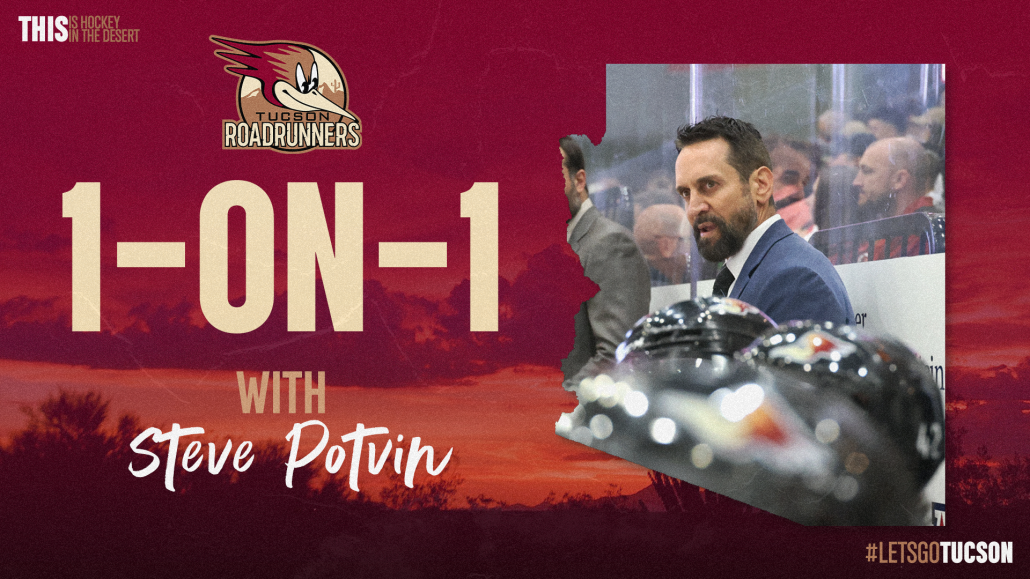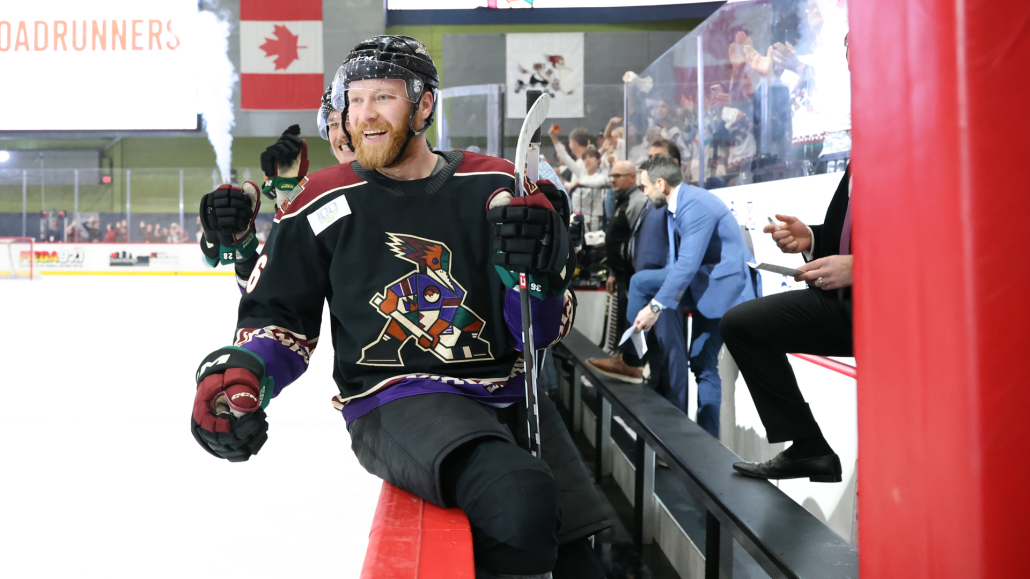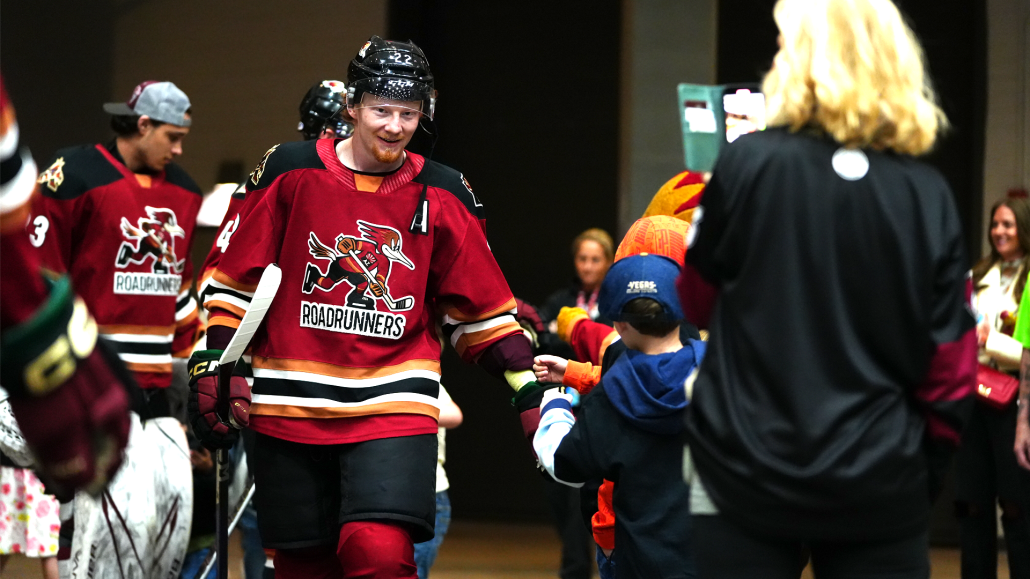1-On-1 With Steve Potvin
Tucson Roadrunners Head Coach Steve Potvin joined Adrian Denny, Kim Cota-Robles and Arizona Daily Star Sports Editor Brett Fera on this week’s season finale of Roadrunners Happy Hour. Catch Happy Hour every Tuesday at 5 p.m. on Fox Sports 1450 AM and the Roadrunners Happy Hour Podcast on the iHeartRadio app. For the complete episode, and to Steve’s rational fear, you can download below.
Listen to “2023-24 Season Finale With Potvin” on Spreaker.
Q: We were just talking about the season here, it was a great ride!
Yeah, we’ve definitely felt the same way. Obviously, everybody wanted to go for a long run. I think everybody was primed and ready to go for it. We did fall short, but it doesn’t mean that we didn’t have a lot of success. We had a very successful season and we saw a lot of growth from our players. That’s really what our main objective is. We want to try to create leaders and players that are ready to play at the next level and at this level and continue to grow. We saw so much of that this season, so we couldn’t be prouder of our process and the guys that came through.
Q: What does your summer look like? How much of a hand do you have in signings over the summer?
Well you know those discussions are ongoing during the regular season. And so there’s obviously a strong opinion already shaped by the time the season ends. There’s continued dialogue at the end of the season, but you know that energy includes communication, conversations and direction during the regular season and afterwards it just continues; but there’s already been a strong dialogue of what the team should look like next season.

Q: We had some hot stretches this season. What did you see clicking and working well when we got hot?
I’m doing, our SWAT analysis for the season right now. Every season we kind of go through our strengths and weaknesses and what opportunities we gave our players and think “what were some of the threats?” I felt like this season was very consistent and I thought that the messaging was good throughout. I thought the buy-in was strong, it was always about growth, it was always about “how do we keep improving ourselves?” and “how do we look for ways to keep improving our team no matter what we were going through?” And so honestly, what I saw was just the continuum of growth; guys who came showed up and they were attacking and looking for ways to find solutions. And we were also during that time working through our relationships. So I just found that it was very consistent and I thought that because we had good players and good people in the room, they were always able to stay focused on what the mission was for that day, for that time period, for what was necessary for individual and team growth. And they never really blocked each other or the team. So really that’s what I saw, just the consistency of the appetite for growth.
Q: We have a ton of different theme nights every season. What theme night do you want to see?
I don’t know if this makes sense, but you know, I’m always you know, 80s or 90s music kind of guy.
Wait, what kind of 80s, 90s music?
Well, the whole stuff, like when we walk in the, in the locker room, there was always like hard rock playing or, very motivational, inspirational music. Now it’s a little bit more creative and more, I guess poetic, there’s more pop culture involved in the locker room today than there is heavy rock where you’re just going to lay it all on the line and battle, compete hard, and just kind of get that “grr” mentality. It’s like a joke with Benny (Ben McCartney) all the time. “Hey, Benny, let’s throw on some AC/DC or some Motley Crew in there or something, you know?” I think those theme nights would be fun for the coaches.

Q: Do you see yourself moving up into an NHL role in the future? It seems like you love to work with prospects so much.
I think prospects can be a broad term also. When you get up to the NHL, there’s ways that you can develop “prospects.” There’s always a prospect of playing at a higher level. And so, that would be my next goal to try to develop a team that is closer to winning a Stanley Cup. It’s kind of an odd picture to have on my phone, but I currently have a picture of this Stanley Cup on my phone, and we want to try to do the best we can to grow prospects and put them in a position to one day win the Stanley Cup. When you see a player like (Adin) Hill get an opportunity to win this Stanley Cup, you feel so happy and proud that they went through our organization and went through this staff. I think everybody that has success at some point or another, it was the people that they’d been around with. If there’s just a small part that we can play it, then obviously that brings us a lot of excitement. So, the next step for me personally would be to try to get to an NHL level and be able to build NHL players to get an opportunity to win a Stanley Cup. I think that would be a great goal and it would be one of the best challenges to really put yourself through.
Q: Have you ever had more fun watching the NHL this year with 19 of our guys getting called up?
It was definitely a great scene for guys to get their first opportunity. You know, when Dylan (Guenther) came to us, there were some real challenges there for him. To see him go through those and then get to the NHL and then really have a lot of success was really rewarding for him and for us to see him have that type of enjoyment and success in the NHL. And then, to see, I’ll start with Cam Crotty, getting his first NHL game. There was some time where he probably thought he was so far away and had so much to prove still to get to the other side and get that opportunity. Seeing him evolve, and dive into it, and really answer the bell a little bit because we challenged him to do certain things that were outside of his comfort zone. He challenged himself and he was rewarded, and he kept getting better. That was so satisfying. And then seeing Koch come from Europe, and not really knowing what to expect. Then I think he sat out the first 11 games. To have to listen to us explain to him over and over again, trust the process, be patient, keep coming and showing up as the best version of yourself, eventually you’ll get the chance, and I suspect over time it’ll be hard for us to take you out and, keep guiding yourself towards the mission of playing in the NHL. To see him get the opportunity, that was really rewarding. Maybe a lot of people’s favorite, was seeing Josh get his opportunity, we’re watching his process. Can he play at the American Hockey League level? Can he be productive at the American League level? Can he skate at the American Hockey League level? Those were all questions that were being asked. And did he leave school too early? So, he came last year, had a really good start in the American Hockey League, helped us in the playoffs, started the season very well, started training camp unbelievable, was one of the leading scorers in training camp. Then he just kept maturing and kept answering questions and his consistency level was high, the pace was high. And then, you know what, he got his call up. He wanted to prove to everybody that he could get called up and be a call up. He got his opportunity on a Tuesday night versus Columbus, and it ends up being a sold out crowd. In his first game, you don’t want to let down your parents, your father’s legacy and the fans, he’s got a lot of pressure, and to be able to really stand in there and he was doing everything he could to survive in that night. He ends up with two goals. And then, you know, the sense of belief that he can play just started to rise. He had an unbelievable campaign in the NHL and watching him go through that was outstanding. And now you think, what’s next? What’s next for all of those players is going to be just as exciting. I think it has to start with having zero expectations. But to answer your question, all of the call-ups were so satisfying this year, all of them, but especially those that had their first career game, like Matty Villalta, those were really special and can’t wait to see what’s to come for those players.




